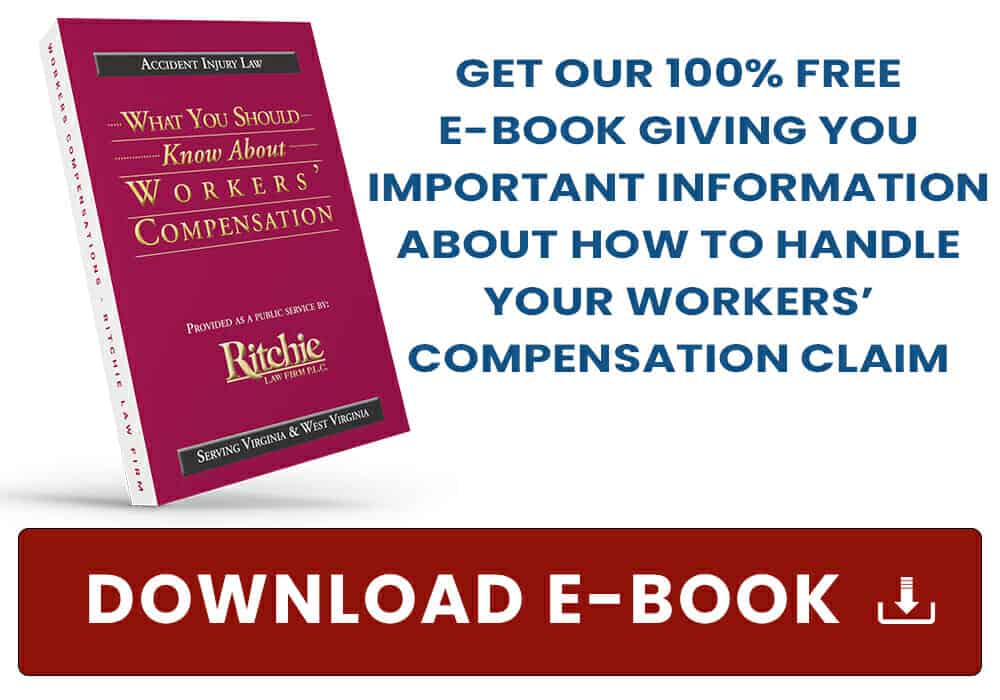Everything You Need To Know About Virginia Workers’ Compensation
Hopefully, you will never be seriously injured at work. But if you are, here is a thorough guide to help guide you through the complex Virginia Workers’ Compensation process.
Virginia Workers’ Compensation: Who Is Covered?
If you are a worker in Virginia, you are covered by the Virginia Workers’ Compensation Act if your employer regularly employs 3 or more full-time or part-time employees and if your injury (or occupational disease) arose “out of” and “in the course of” your employment. The wording of these definitions may be hard to understand. Let’s break it down.
“Arising Out Of”
To be covered by Virginia Workers’ Compensation, your job injury must “arise out of” your work. This basically means that your injury has to be caused by a risk involved with doing your job. Often injuries that are caused by incidents that everyone has an equal risk for (like tripping over your own feet) may not be covered.
“In the Course Of”
The part of the Virginia Workers’ Compensation Act that says a job injury has to happen “in the course of” your employment to be covered basically means that the accident has to happen at the place where you were assigned to be working at the time. Usually, a covered accident happens at a particular time and place and is not the result of cumulative or repetitious activity.
What Injuries Are Covered?
Any injury (or occupational disease) that happens “out of and in the course of employment” is covered by the Virginia Workers’ Compensation Act. It doesn’t matter who was at fault in the accident.
Covered injuries might include some of these injuries: broken bones, muscle strains, back and neck problems, loss of strength and/or flexibility, heart problems, and others. Typically, injured workers in Virginia are not entitled to pain and suffering.
What To Do If You Are Injured Or Contract An Occupational Disease On The Job?
- Report Your Injury. As soon as possible, give WRITTEN notice to your supervisor about your injury. Explain when and how the accident happened. You should report all accidents, even if the injury seems minor. If you fail to give notice to your employer within 30 days from the date of your accident your right to benefits may be affected.
- Report Your Injury to Your General Contractor. If you work for a subcontractor (for example, for a construction job), you should not only give notice to the subcontractor but also to the general contractor. Check out this article for an in-depth look at general contractors and heavy industry accidents.
- File a Claim for Benefits Form. To protect any deadline that might pertain to your claim, you should file a Claim for Benefits Form with the Virginia Workers’ Compensation Commission. Claim forms can be found and filed online at the Virginia Workers’ Compensation Commission website. For more information about how to file a Virginia Wokers’ Compensation Claim for Benefits form, read our article here.
How Do I Get Medical Treatment? Insist on the list!
After you give your employer notice of your accident, the employer is required to give you a list of at least 3 doctors. You are required to choose a treating doctor from this list. If your employer doesn’t give you a list, you may be allowed to choose your own treating doctor. Don’t let your employer force you to go to the “company doctor.” INSIST ON THE LIST!!! Check out this article on treating doctors in Virginia Workers’ Comp.
What Medical Treatment Does My Employer Have to Pay For?
Your employer (usually the employer’s insurance company) is required to pay for services that your treating doctor gives you directly, for any treatment that your treating doctor prescribes, and for any specialist the treating doctor refers you to. Your employer is responsible for treatment directly related to your injuries for as long as you continue to have problems as a result of the injury. Your employer doesn’t have to pay for any medical care that your doctor doesn’t authorize or that isn’t required for treatment of your work injury.
What Should I Tell My Doctor?
Of course, you should tell your doctor that you were hurt on the job. You should also give your doctor as much detail as possible about what happened to your body in the accident, which body parts were affected, where you have bruises and soreness, whether you lost consciousness, as well as any problems you have with your vision or memory. You should be ready to describe the kind of pain you have, where it’s located, whether it’s sharp or dull, whether it involves burning, tingling, or numbness, how long it lasts, what makes the pain worse, and whether over-the-counter medication seems to help.
It is VERY IMPORTANT that you let your doctor know that your first priority is getting better, and you will do whatever it takes to make a complete recovery.
What Kind of Wage Benefits Are Available To Me?
The Virginia Workers’ Compensation Act provides for several types of wage benefits. Read this article for an in-depth look at Virginia Workers’ Compensation wage benefits. Wage benefits are based on your “average weekly wage”. Your average weekly wage is based on your gross earnings before the accident and includes overtime. You can find out more specifically how to calculate average weekly wage here. You are eligible for up to 500 weeks of compensation for your job injury.
1. Temporary Total Disability Benefits. If your work injury prevents you from doing any work, you may be eligible for temporary total disability benefits or TTD.
2. Temporary Partial Disability Benefits. If your injury allows you to work light-duty or part-time, you might be eligible for temporary partial disability or TPD. You might also be eligible for TPD if you have recovered from your injury enough to work light-duty or part-time.
3. Total and Permanent Disability Benefits. You might qualify for total and permanent disability if you lose the use of 2 body parts as a result of the same accident.
4. Cost of Living Adjustments. If you are already getting temporary total disability or permanent total disability, you might be eligible for cost of living increases to your wage benefits. You must request this supplement.
What If My Claim Is Accepted?
If your claim is accepted by the employer’s insurance company, you might be asked to sign a form called Award Agreement. This form states that you were injured on the job, lists the time you were off work, and has other information about your claim. MAKE SURE ALL THE INFORMATION ON THE FORM IS CORRECT!! After the Award Agreement is filed with the Virginia Workers’ Compensation Commission, you will receive a copy. Understand the importance of keeping accurate written records about your workers’ comp claim.
What If My Claim Is Denied?
If your claim is denied or if you are receiving benefits but have not received an Award Agreement, you MUST file a Claim For Benefits Form with the Virginia Workers’ Compensation Commission. If your claim has been denied, a hearing date will be scheduled.
What If I’m Released to Light-Duty Work?
If your doctor says you can do light-duty work or work with restrictions and your employer doesn’t have any suitable work available for you, you will be required to look for jobs that meet your restrictions. If your insurance company offers to help you find work, you are required to cooperate. You may be entitled to receive wage benefits until you are successful in finding a job.
What If I’m Released to My Pre-Injury Job?
If your doctor says that you can go back to the job you did before your injury, your employer will send you a “Termination of Benefits” form for you to sign. Your employer does not have to offer you a job or find work for you after your doctor releases you to regular duty work.
Talk To a Virginia Workers’ Compensation Lawyer
If you’ve been injured on the job, it is wise to talk to a lawyer who is experienced in workers’ compensation claims. At the Ritchie Law Firm, you can talk to us for FREE . . . NO STRINGS ATTACHED! We can give you advice on your claim before you make a decision that could damage your case. Check out our article on “How Much Does a Workers’ Comp Lawyer Cost” here.
For more than 45 years, the Ritchie Law Firm has successfully helped thousands of injured workers navigate the complex workers’ compensation process. The Ritchie Law Firm specializes in serving injury victims. We never represent insurance companies or corporations. If your workers’ compensation case is going to hearing, you will want a trial expert on your side. We are board certified trial specialists through the National Board of Trial Advocacy. The attorney you choose for your workers’ compensation case can make all the difference.
Virginia Workers’ compensation is a complex system that can be very difficult to navigate. Be very careful to make certain that your rights are protected before you sign anything. Talking to our workers’ comp lawyers about your claim is free. If we take your case, we don’t get a fee unless we win your case. There is no risk to you to get some information about your case before you make any decision that might negatively affect its outcome.


